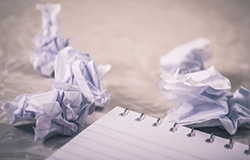My drug of choice in college was Vitamin B-1. An allegedly healthy version of speed, it not only kept me up all night so I could meet an English Lit deadline—it kept me way up: enthused, imaginative, eloquent, ultra-brilliant. Or so I thought. One night, through my B-1 eyes, my Daniel Defoe essay became downright thrilling. I discovered the essence of Moll Flanders, the deepest meaning in Moll's risqué adventures. I wondered if I should become a Defoe scholar, devoting myself to his every word, published and otherwise. High on B-1, my passion for Defoe was only slightly less powerful than my arrogant pride in what I'd written. Wow—who knew that spending the night with Daniel D. could be so electrifying, and that my very own words could unlock his literary secrets?
And then: the morning after. In the harsh light of day, after the superwoman vitamin had worn off, I re-read my essay. What was I thinking? How had I deluded myself that this pedestrian analysis of Moll Flanders was worthy of anything more than a C+?
Thankfully, I learned to write without the benefits of B-1, but I still find myself prone to another deceptive mental state: writer's high. Similar to what I experienced as a college essayist, writer's high is that feeling I sometimes get after a rousing day of word production. I've done it! I tell myself. I've nailed it! My reader is certain to be profoundly moved, inspired, enlightened! But after years of writing for a living, I know enough to sleep on it. To set aside what I've written and come back to it the next day—or in several days—when my writer's high has dissipated. Sometimes my reaction upon re-reading yesterday's pages is similar to my dejected response to the Moll Flanders fiasco on the morning after. And then there are those instances when I am pleasantly surprised: Alright! This chapter (or story or book proposal) actually reads pretty well. Maybe it won't need much editing or re-rewriting.
As a writer who has been edited numerous times, and who also edits the work of other writers, I realize that everyone needs an editor. It is impossible to be your own because it is impossible to be objective about your own writing. Why? Because there is a little writer's high lurking in all of us who put our fingers to the keyboard; otherwise we wouldn't be writers in the first place. It's exhilarating to read your own words, to create something from nothing, to sense that your writing will have an impact on others. But if you recognize yourself in my B-1 scenario, perhaps it's time to admit your occasional (or habitual) vulnerability to writer's high—and deal with it before you overdose. Here's how:
- Acknowledge that you are powerless over the wonderful feeling that what you have just written is uniquely probing, delightfully entertaining, or distinctively brilliant.
- Realize that such a feeling can be fleeting.
- Set aside your writing for a day or more. When you re-read it, see if you still agree with your initial assessment.
- Commit to re-thinking and re-writing—even if you initially believe that what you've written is just about perfect.
- Value the enthusiasm and motivation you have for writing, but also appreciate the value of an objective reader or professional editor.
- Talk to your literary mentor to find out if Vitamin B-1 is right for you.
Copyright (c) 2012 Laura Golden Bellotti. Please contact the author lg********@ho*****.com for permission to reprint.
- How to Find and Interview a Ghostwriter - June 2, 2023
- Do You Need a Developmental Editor? - October 1, 2022
- How Long Does It Take to Write a Book? - March 5, 2021



